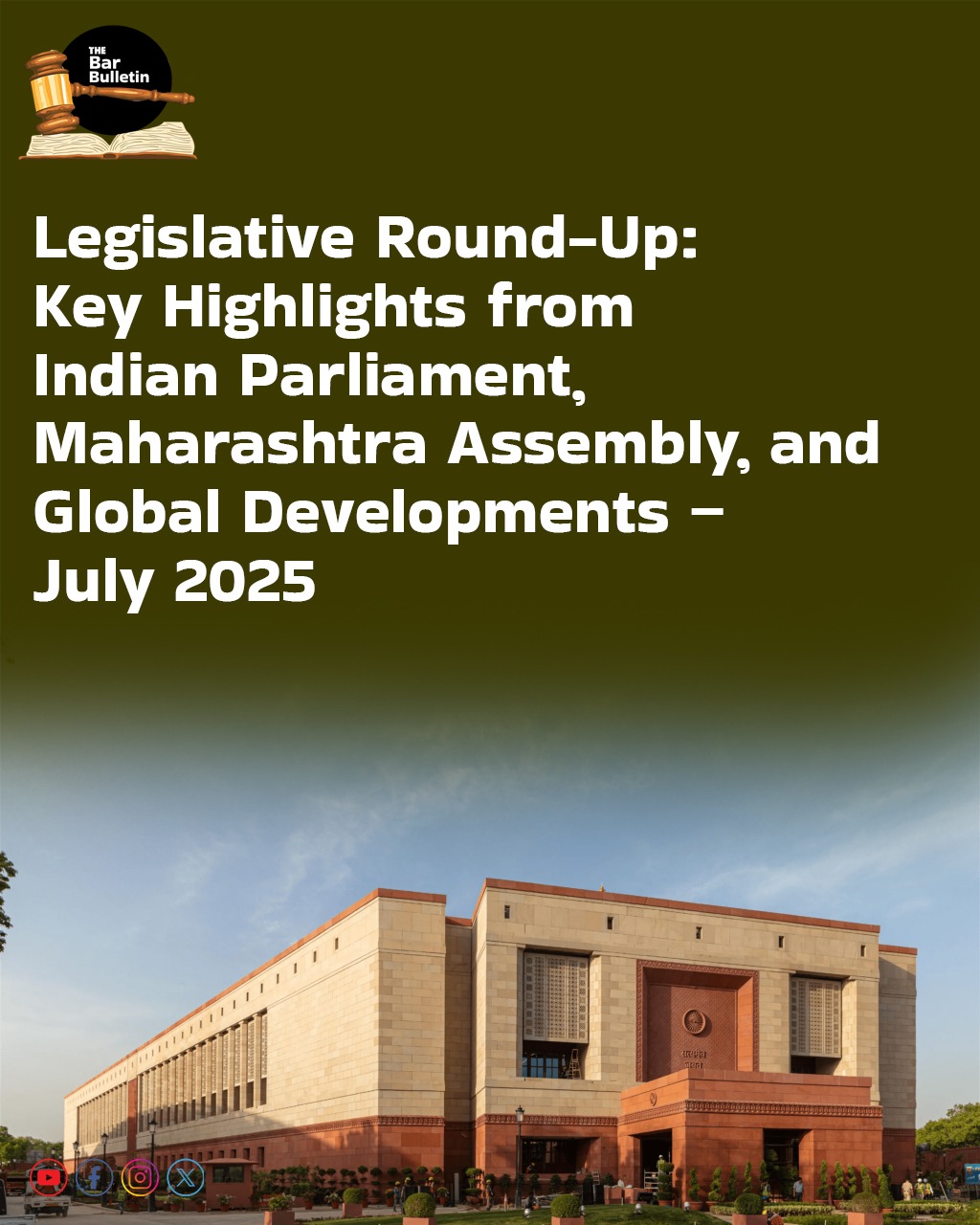The month of July 2025 witnessed a flurry of legislative activity both in Maharashtra’s Monsoon Session and across key global jurisdictions. While the Maharashtra State Legislature focused on security, tax alignment, urban planning, and social welfare reforms, international legislative bodies addressed issues ranging from financial regulation and sanctions to digital resilience and institutional reforms.
In India, the state government passed the controversial Maharashtra Special Public Security Bill, prompting civil liberties debates, while also approving supplementary budget allocations and amending core planning and tax statutes. Meanwhile, on the global stage, legislative and regulatory authorities in the European Union, United Kingdom, United States, China, and other regions pushed forward significant measures on financial stability, geopolitical sanctions, digital governance, and bilateral trade.
This round-up captures the most impactful legislative developments across these domains, offering a consolidated view of key statutes, debates, and regulatory trends shaping policy discourse in India and internationally during July 2025.
I. Notable Legislative Actions in Indian Parliament – Monsoon Session (July 2025)
July 21, 2025 (Day 1):
- Bills of Lading Bill, 2025: Passed by Rajya Sabha; awaits Presidential assent. This bill replaces the 1856 Indian Lading Act, modernizing legal frameworks for maritime commerce.
- Parliamentary proceedings saw frequent adjournments due to opposition protests over the Bihar voter list revision controversy.
July 22–23, 2025:
- National Sports Governance Bill, 2025 and National Anti-Doping (Amendment) Bill, 2025 were introduced in Lok Sabha, aimed at reforming India’s sports governance and regulatory framework.
- A scheduled debate on Operation Sindoor was repeatedly stalled by disruptions, limiting productive discussion.
July 24–25, 2025:
- Continuing opposition demands over the Bihar Social Inclusion Report (SIR) led to adjournment of both Houses until July 28.
- While preparatory work for financial and taxation bills was underway, substantial business was disrupted and deferred.
II. Maharashtra Legislative Update – Key Highlights from the Monsoon Session
The Maharashtra Legislature, during its July 2025 Monsoon Session, passed several impactful legislations focused on security, tax reform, urban planning, and social welfare:
1. Maharashtra Special Public Security Bill, 2025
- Passed: July 10 (Assembly), July 11 (Council)
- Purpose: To curb unlawful activities, with specific reference to terrorism, Naxalism, and activities deemed threats to public order.
- Key Provisions:
- Declares individuals/organizations as “unlawful.”
- Authorizes seizure of property and freezing of bank accounts.
- Empowers investigation and prosecution under a special mechanism.
- Controversy: Civil liberties groups and opposition members flagged threats to free speech and personal liberty under Articles 19 and 21.
- Public Reaction: Widespread protests erupted in Mumbai and tribal areas over fears the law could be used to stifle dissent.
2. Maharashtra Goods and Services Tax (Amendment) Bill, 2025
- Introduced: July 7, 2025
- Objective: To align state GST laws with the Finance Act 2025 at the national level.
- Key Amendments:
- Streamlines the appellate process.
- Revises rules for input service distribution.
- Modifies pre-deposit penalties.
- Impact: Ensures national uniformity in tax structure, particularly affecting SEZs and warehousing sectors.
3. Maharashtra Regional and Town Planning (Amendment) Act, 2025
- Introduced: July 15, 2025
- Highlights:
- Enables time-bound approvals and deemed clearances for planning proposals.
- Boosts affordable housing through incentives and fee waivers.
- Reduces penal interest for delayed development charges.
4. Supplementary Budget Approvals
- The Assembly passed over ₹57,500 crore in additional expenditure.
- Key allocations included the Ladki Bahin scheme, welfare programs, and local infrastructure development.
III. Global Legislative & Regulatory Developments (July 16–26, 2025)
European Union (EU)
- Delegated Regulation (EU 2025/1184): Added Algeria, Angola, Côte d’Ivoire, Kenya, Laos, and Lebanon to the high-risk third countries list.
- Financial Supervision: ESAs issued guidance under the Digital Operational Resilience Act (DORA) and updated Prospectus Regulation standards.
- Sanctions: The EU rolled out its 18th sanctions package on Russia, targeting banking, energy, and defence sectors.
United Kingdom (UK)
- Implemented reforms to derivatives trading via amendments to the Financial Services and Markets Act 2000 and MiFID rules.
- Introduced statutory instruments for Buy-Now, Pay-Later (BNPL) services; FCA opened consultations on future regulation.
- Bank Recovery and Resolution (Amendment) Regulations 2025 laid before Parliament.
China
- Initiated public consultation on Cross-border Interbank Payment System rules.
- Condemned U.S. sanctions on Cuban officials and pushed back against NATO’s trade scrutiny.
Hong Kong
- Gazetted regulations to implement Basel cryptoasset standards.
- Discussions launched on accelerated settlement in cash markets and updated capital rules for intermediaries.
Singapore
- Enforced the Protection from Scams Act 2025.
- Released the annual Sustainability Report, outlining green finance and ESG priorities.
India (International Trade & Finance)
- Government set to release new export promotion guidelines.
- RBI lifted restrictions on Religare Finvest.
- India–UK CETA Agreement signed to enhance trade and investment ties.
United States
- Sanctioning Russia Act, 2025 (S. 1241/H.R. 2548) placed on hold for bipartisan amendments.
- Announced intent to withdraw from UNESCO.
- Debates continued on further sanctions on Russia and the snapback of UN sanctions on Iran.
Iran
- Appointed new legal experts to the Guardian Council on July 16, 2025.
United Nations Security Council (UNSC)
- Under Pakistan’s presidency, the UNSC emphasized multilateralism and peaceful resolution of disputes.
- Debates held on Haiti, Yemen, Sudan, and Cyprus.
- Key votes scheduled on the extension of mission mandates and sanctions regimes.



